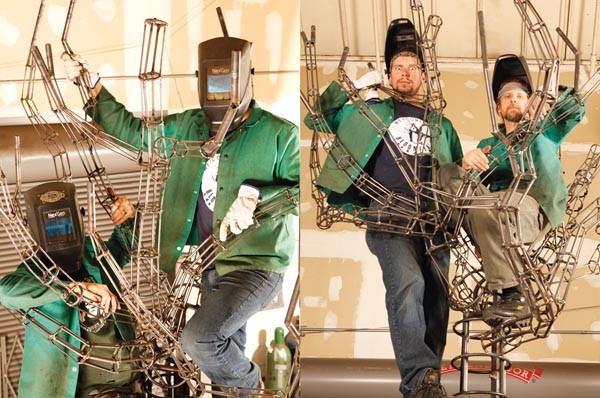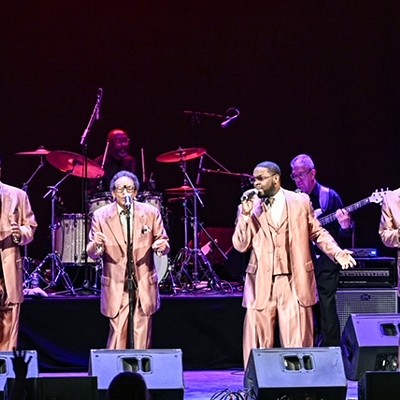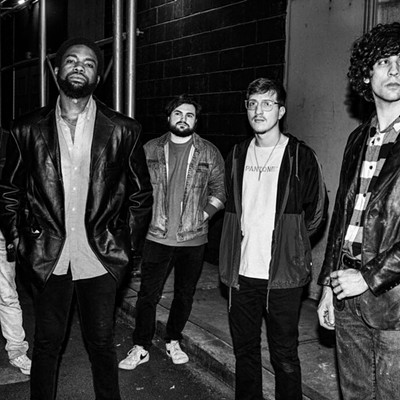Pete Spynda and Matt Tuite hold up two pretty different ends of the local music scene. Spynda, who's played bass in a slew of local bands, is best known these days as the architect of Pandemic, the monthly world-music DJ night at Brillobox. Tuite, a guitarist, currently plays with the brash punk band Mud City Manglers. But the two spend most of their days together ... building dinosaurs.
It is, of course, difficult to make a living making music full time. While Pittsburgh has launched some careers of late (one can assume that Mac Miller isn't stocking shelves at the Frick Park Market when he's home from tour, and Girl Talk's Gregg Gillis shucked his job in biomedical engineering some years ago), most of the people you see onstage at clubs in the evening are coming off a full day of work. Balancing the two — the time constraints, the creative and emotional taxation — is a task that leaves plenty of musicians scrambling for a suitable solution.
Spynda and Tuite both work for Phil Fraley Productions, a company that builds exhibits for natural-history museums and similar institutions. It's not the coffeeshop or bar job where you might expect to run into a part-time musician, but given the art background that many musicians have, it's something of a natural fit. Spynda sees building exhibits as a structured way of expressing his creativity — but he still looks to making music as a form of release.
"In this job, you're basically making art for scientists," he says. "I still have the drive to make music. As much as I love what I do at work, I have to leave that at work. It's not mine. You're building it for someone else. You don't get to sign your name to it."
Tuite has been with Fraley since 2008. ("I came in during the mastodon," he says.) He also went to art school (in Chicago) and, owing to a lifelong interest in science and a background in visual art, sought work at Fraley when he found out the company had opened a Pittsburgh site. Like Spynda, he acknowledges that working on exhibits is an exercise in restrained creativity. "The bones make the rules," he notes.
Fraley takes both Spynda and Tuite out of town once or twice a year to install exhibits. (The company, based in New Jersey, works with institutions across the country.) Being out of town for a few weeks at a time can affect band practice and shows, but generally only to a small extent.
"With Pandemic, it's regular — it's the first week of the month," says Spynda. "I've arrived back in Pittsburgh from a work trip the day of Pandemic, but I haven't missed one yet. And in fact I actually DJ'd a party in L.A. when we were out there installing an exhibit."
Scott Canavan of Slingshot Genius also looks at business travel as an opportunity. The singer and guitarist works as a regional director of training for Outback Steakhouse. Training restaurant employees on best practices might seem far from a job for a creative type, but Canavan makes it work to his advantage.
"I take my guitar with me, and a lot of my stuff has been written in hotels," Canavan says. "I have a song that I wrote in the parking lot of the Starbucks in St. Clairsville, Ohio."
Plus, he takes advantage of his evenings to check out bands in other cities.
"Cleveland's a great town for music; I get to go to Detroit a lot. Last week I was in Philadelphia and saw band called Rotary Downs and talked to them after the show — they said they were playing the next night in Pittsburgh, at Club Café. I said, ‘I'll be there!' and sure enough, I grabbed a few friends and came to see them the next night."
Singer and pianist Nina Sainato left a full-time job to make her own hours. Sainato, who has music and multimedia degrees from Duquesne, spent some time in a desk job with WDVE, but realized it didn't fit with her plan for herself.
"I woke up one morning and said, ‘Oh, my God, what am I doing?' I saw myself in a job that was really enjoyable, but I thought, ‘What I am doing with my life?'"
A new job with the Pittsburgh Symphony Orchestra (she refers to her job at both the PSO and WDVE as "web guy") proved to only be a stopgap. "I hate that rigid daily routine. I felt like I was wasting my life."
So she started building websites from scratch — one for herself, and for other artists. Last spring she officially went into business as Minor Keys Media. Working for herself has worked out a bit better.
"I don't always have the urge to write, and sing, and play," Sainato, who largely works from home, says. "No one does — you can't force it. So when I do have that urge, I can stop what I'm doing and work on it."
Stephen Patchan, who plays guitar in The Ceiling Stares, works in a rather precarious spot for a rocker: local government. Patchan has been the Pittsburgh's Bicycle/Pedestrian Coordinator since 2008. It's a city-planning position concentrating on taking the needs of cyclists and pedestrians into account.
At first, he says, he was a bit reluctant to let his life as a rock guitarist interfere with his day job. "When I first started, I was more sensitive about it. It is a political position, and there are certain elements of rock 'n' roll that don't jibe with that. But of course, it's not like I'm G.G. Allin or anything like that."
One of the challenges many part-time musicians face is finding the time and energy to pursue their music on top of the work they're doing all day.
"When I was in a 9-to-5 job, it was almost impossible to make music," Sainato says. "You get into a routine — you go to work, you go home, eat dinner, turn on the TV."
"Sometimes when I get home I just want to veg out and read or surf the Internet," says Spynda (who, like Canavan, has the added project of being a dad). "I know I should be playing bass and writing music."
Patchan, though, generally looks at music as a way to release energy — not something he takes overly seriously. While he notes that The Ceiling Stares play music that can be challenging, he says, "I work my brain harder at work than when I'm working on music."
Patchan notes that, while he doesn't necessarily bank on planning-office coworkers coming out to Gooski's on a Saturday night, he does see crossover between his day job and night gig. "The bike community is a pretty social demographic," he says. "The same people who come to community meetings come to rock shows."
Sainato notes that she's ended up networking professionally at her shows. "You play a gig and mention ‘I make websites for a living,' and someone's bound to say ‘Oh, my God, I need a website!'"
For his part, Canavan says it's almost preferable — at least for him — to be in a position where his day job pays the bills, and music can follow. And while he values his job, he also notes what plenty of musicians would say about their day jobs: "I think you have to do what you don't wanna do in order to do what you do wanna do."














